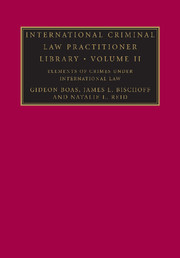Book contents
1 - An overview of crimes under international law
Published online by Cambridge University Press: 10 December 2009
Summary
Yves Sandoz once wrote: ‘It has often been said that one of the most pressing tasks for international criminal law is to set out clearly what violations are punishable under that law and to define them in specific terms.’ This second volume in the International Criminal Law Practitioner Library examines the elements of crimes under international law, primarily as they have been defined in the jurisprudence of the International Criminal Tribunal for the former Yugoslavia (ICTY) and the International Criminal Tribunal for Rwanda (ICTR) (collectively, the ‘ad hoc Tribunals’). This jurisprudence has contributed greatly to the nuanced definitions of the core categories of crimes under international law applied in current and future international adjudication, and is the richest body of contemporary applications of the law on elements to the actual facts of cases. Despite this contribution, the specificity referred to by Sandoz appears elusive: the case law is frequently contradictory or obscure, and thus requires analysis to explain the legal principle clearly, or at least to identify what is unclear and in need of further jurisprudential deveopment. Such an analysis is the fundamental goal of this book, as it is of this series.
Two consequences flow from our focus on the judicial interpretation of the scope and content of crimes under international law.
- Type
- Chapter
- Information
- International Criminal Law Practitioner Library , pp. 1 - 13Publisher: Cambridge University PressPrint publication year: 2009



